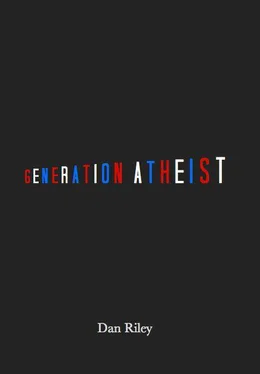For many years I was able to reconcile my Democratic politics with my faith, but that became increasingly difficult over time. In 2004, my junior year of high school, the LDS Church came out with an official statement in which the Church supported the constitutional amendment to ban gay marriage. My seminary teacher read aloud that statement. This really concerned me. Primarily, I was offended as a liberal. The Church became increasingly strident against homosexuality. Political statements that the Church made hurt me deeply.
Additionally, I was also quite concerned about the war in Iraq. I’m a military brat. My dad’s a military man, so I’ve always taken particular interest in foreign policy matters. I was vehemently against the war. I thought it was a travesty, always have. The Church never explicitly or officially endorsed the war, but its silence on the matter was deafening. The Church claims to be non-political in the sense that it won’t take political stances, it will only take moral stances. I thought, “If war isn’t a moral issue, then I don’t know what is.” I was upset that the Church broke its political neutrality to condemn gay marriage but not, from my view, an illegal, unjust war.
Finally, I decided to leave Mormonism. When I left, I had a brief flirtation with other religions. On any given Sunday, I would drive to a different church. I went to several non-denominational services, and I went to a Catholic mass. I was looking into other religions because when I initially left Mormonism, there was something that left me. My life revolved around the Mormon community and its culture and its beliefs. After I left the faith, I thought, “I’ve got to find something because I have nothing otherwise.” But, after coming out of a faith tradition like Mormonism, I found that other religions paled in comparison, that they were small and quaint, just unsatisfying. Because they weren’t all-consuming, they didn’t seem to fill the void that I felt after leaving the Church.
I considered myself an agnostic for a period of time. I think that just stemmed from a misunderstanding of what atheism is. I thought atheism had to involve the absolute denial of the possibility of any supernatural being, when it really needn’t. I realized that atheism and agnosticism are not actually mutually exclusive. That’s when I began to call myself an atheist. It was liberating because my entire experience with Mormonism was one of staving off cognitive dissonance. It was liberating because I began to be able to accept myself for who I really am. In that sense, atheism was a godsend. Politically, it was also liberating for me because while I was never ashamed of my liberal politics in the Church, I no longer had to reconcile them. I’ve always prided myself in being someone who could go against the grain and be comfortable as the black sheep. Losing the Mormon community was hard for me because I lost a number of friends, but I’ve always been willing to make those kinds of sacrifices for my beliefs.
Not everything about leaving my religion was easy, though. My parents cried, and there were a lot of tears. I would like to think that they were concerned because in Mormonism, if you have a family member who falls away from the straight and narrow, then that jeopardizes the family’s ability to live with that person in the next life. Mormons put a lot of stock into that idea that families are forever, that you go to the celestial kingdom in heaven as a family, which is somewhat different from some Christian religions. With traditional Christianity, marriage isn’t necessarily deemed to be eternal. Marriage is often seen as for this world only. Mormons extend such concepts to the next life; they’re very sacred. Initially, I thought, “My parents must be crying because they’re concerned that they’re not going to see me in the next life.” But I think I’ve come to find — and I don’t mean this to reflect poorly on my parents — that my parents were concerned about how my leaving would reflect upon their parenting.
Their concerns, as I learned, were justified. In the LDS community, Mormons are taught that if a family is worthy and if a family has good parents, they’ll rear a good, healthy Mormon family. The family will remain faithful all their lives; if they don’t, it will have been because the parents messed up somewhere along the line. The majority of the pain that I felt leaving the Church wasn’t for myself. I’m a fairly independent creature. I was able to deal with whatever little persecution came my way. I was offended and hurt on behalf of my family because I could tell my family was hurting. They got looks at church once the congregation heard the news that I had left the faith. My bishop explicitly told my parents in a private meeting that the reason that I left the Church and the reason that I’m bisexual is because my family hadn’t hosted family home evenings when I was a little kid. I think the main source of their pain and, by extension, my pain, was the fact that they blamed themselves for my leaving Mormonism. They aren’t angry that I left. I think they’re just sad because they feel like bad parents.
There have been other tough times as well. A few years ago, at Christmas, I was home, and I’d gone on the computer and downloaded the movie Religulous . I was watching it on the computer, and my mother walked by and caught onto what I was viewing. We got into a big fight, and she said, “How dare you disrespect me by watching this film on the night before Christmas, Jesus’s birthday!” I have come to find that her issue wasn’t really with my watching Religulous on Christmas Eve, but rather that sometimes she doesn’t enjoy having me around the house because my presence reminds her that she’s a failed parent, that she didn’t do her job. That really hurt me. It hurt because I don’t consider myself a failure of a son by any measure. If I’m bitter about one thing about Mormonism, it’s what my leaving the religion has done to my mom and dad, not to me. I can’t quite get over what it’s done to them and how it’s made them feel. That said, for the most part, I still get along quite well with my family. Given their upbringing and beliefs, I really couldn’t ask for more tolerant or understanding parents.
The basis of a lot of Mormons’ beliefs and the faith of a lot of religious people is they’re convinced that without their religious notions, without their philosophies, that they’re just dirt, that they lack importance. Religion often preys on self-confidence. People are told by their religious leaders that they can’t live without God. The extent to which people need religion has been manufactured from childhood; kids are often told that without God, they’re nothing.
In reality, people don’t need God. Atheism, in this sense, can’t help but be liberating. It can be life-affirming in ways that religion never can be. Religions often devalue this life as a trial to be endured in order to receive another, better life. Atheism does not do this; it places emphasis on this life.
Most people are taught misguided — and often religiously-driven — ideas about positive human characteristics. There is, for example, really no mystery about morality. It is innate in us, not because God inscribed it upon our hearts, but because we humans are, by our nature, social creatures. We either get along or we die. Atheists are no less moral than any other group. In fact, atheists are underrepresented in America’s prison population. The most atheistic countries, like Sweden and Denmark, enjoy exceptionally low crime rates and boast high levels of social equality. A recent study even named Denmark “the happiest place on Earth.” So people can — and millions do — lead moral, meaningful lives as atheists.
I think atheists need to be evangelical about their atheism. I am not looking to tear something down. I don’t want to rob people of the happiness and comfort that they derive from religion. Rather, I want them to know that they can find meaning in their lives by turning inward and making that meaning for themselves, as opposed to believing that they have to follow the dictates of some kind of celestial overlord to micromanage their life. People need to harness the power that is within them. This idea is so empowering and so exciting. When I was Mormon, for example, I was very liberal, and I was a Democrat, but I wasn’t the most active Democrat. I wouldn’t go out and protest. I wouldn’t write letters to the editor. But I’ve done that more now that I’m an atheist. I think that there’s something about atheism that makes activism possible.
Читать дальше












